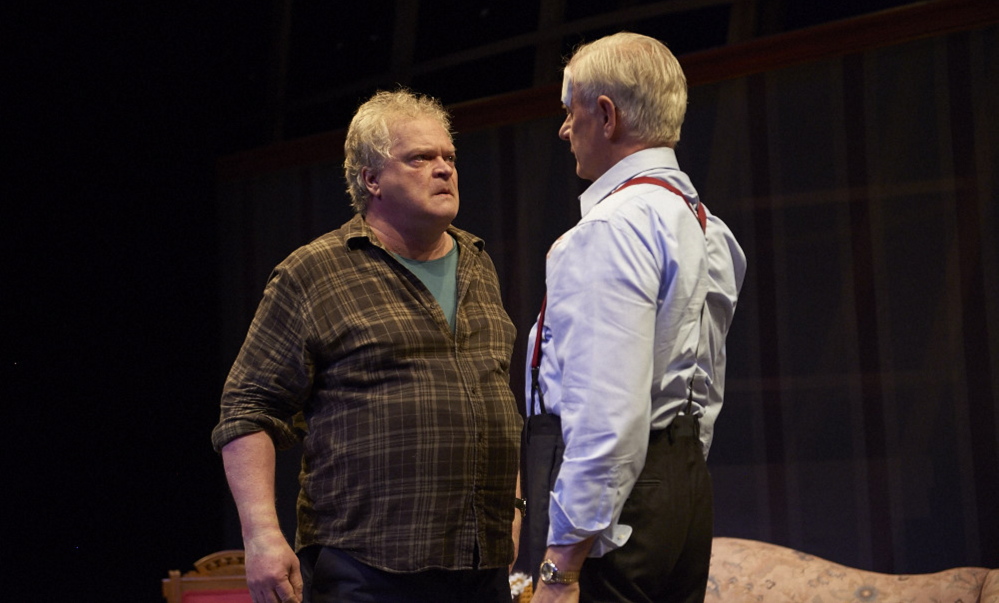“It’s not just you, Jake. You’re not one man. Nobody is one man.”
That’s the cry of Ernie Donohue, the central character in “Papermaker,” a new play by Maine author Monica Wood, which is playing at the Portland Stage Company through May 24.
It’s a play about the ties that bind us – in a marriage, in a family, in a community, as human beings.
And in the workplace. The play is set in a mill town during a strike, in the household of union member Ernie and his wife, Marie, who are seeing all of those bonds tested.
And it’s a period piece. Wood set the strike in 1989, when it was becoming clear that the once powerful labor movement was in trouble. American business was in the process of cashing in its domestic manufacturing investments and moving its bets overseas, taking away more than just jobs.
Twenty-six years later, we know what happened. A way of life disappeared as factories closed. Ernie might have thought things were tough in ’89, but union members look back at that time as the good old days.
I know. Like Ernie, I am a union member. Like Ernie, I am vice president of my local, in my case News Guild of Maine Local 31128, TNG-CWA, AFL-CIO.
Unlike Ernie, I have never been out on strike, but I have seen some tough times.
Let me tell you about my union. In 2008 we organized a voluntary furlough program to head off what would have been the fourth round of layoffs in a year. Members took unpaid time off so others could keep their jobs in the middle of a recession.
The next year we negotiated a contract that cut our pay and benefits, allowing new owners to reorganize the company and start over. Two years later, when those investors gave up, we kept pushing, working to find a new owner who would keep us afloat. And, as we learned Tuesday, we will have to start over again, when our company changes hands one more time in about a month.
It’s been hard work. We did it to protect our own jobs, but we also did it to save the job of the person at the next desk and the next department – from the newsroom to the loading dock. The vote to cut our own pay won by a landslide and when the ballots were counted, we celebrated.
What did we win? The right to come to work. The right to do our jobs. We won the chance to influence our futures instead of watching passively. We won the pride of being part of something bigger than ourselves.
That’s never the side of unions that you hear about, which makes Wood’s play such a welcome addition to the conversation about the value of work.
Ernie is not trying to get rich, he’s not trying to kill the company. He just wants to be treated decently and take care of his family.
Labor unions are far from perfect, but neither is any organization made up of human beings, from the government, to the churches to the corporate boardroom. It’s become easy to demonize union members because there are so few of us left.
In 1960, 30 percent of the private sector workforce was represented by a union. Twenty years later, it was 15 percent. By 2000 it was less than 10 percent and by 2012 it was less than 7 percent.
The decline in membership coincides neatly with stagnation of American wages, which have not increased in real terms since Ronald Reagan made “Are you better off than you were four years ago?” the most important political question of the age.
Utopians predict a future when unions will be unnecessary. Technology is supposed to turn every one of us into an economic free agent who can rise or fall according to his merits. Our society will be built on the sum totals of the self-interested decisions made by millions of independent, rational actors.
We don’t talk about “class” in America unless we are talking about the “middle class,” which, depending on who’s speaking, includes everyone from corporate vice presidents to food stamp recipients.
We have been trained not to look beyond our own needs and to distrust collective action, as if only individuals can really be strong. But that’s not true.
Couples are strong, families are strong, communities are strong, and workers who stand up for each other are stronger than a free agent. Whether you believe in class or not, we rise and fall together.
“You’re not one man,” Ernie says. “Nobody is one man.”
So, go see “Papermaker” (if you can still get tickets). It’s a great story about human struggle, and it’s a much-needed reminder of how we are all part of something bigger than ourselves.
Greg Kesich is the editorial page editor. He can be contacted at 791-6481 or:
gkesich@pressherald.com
Twitter: gregkesich
Send questions/comments to the editors.



Success. Please wait for the page to reload. If the page does not reload within 5 seconds, please refresh the page.
Enter your email and password to access comments.
Hi, to comment on stories you must . This profile is in addition to your subscription and website login.
Already have a commenting profile? .
Invalid username/password.
Please check your email to confirm and complete your registration.
Only subscribers are eligible to post comments. Please subscribe or login first for digital access. Here’s why.
Use the form below to reset your password. When you've submitted your account email, we will send an email with a reset code.